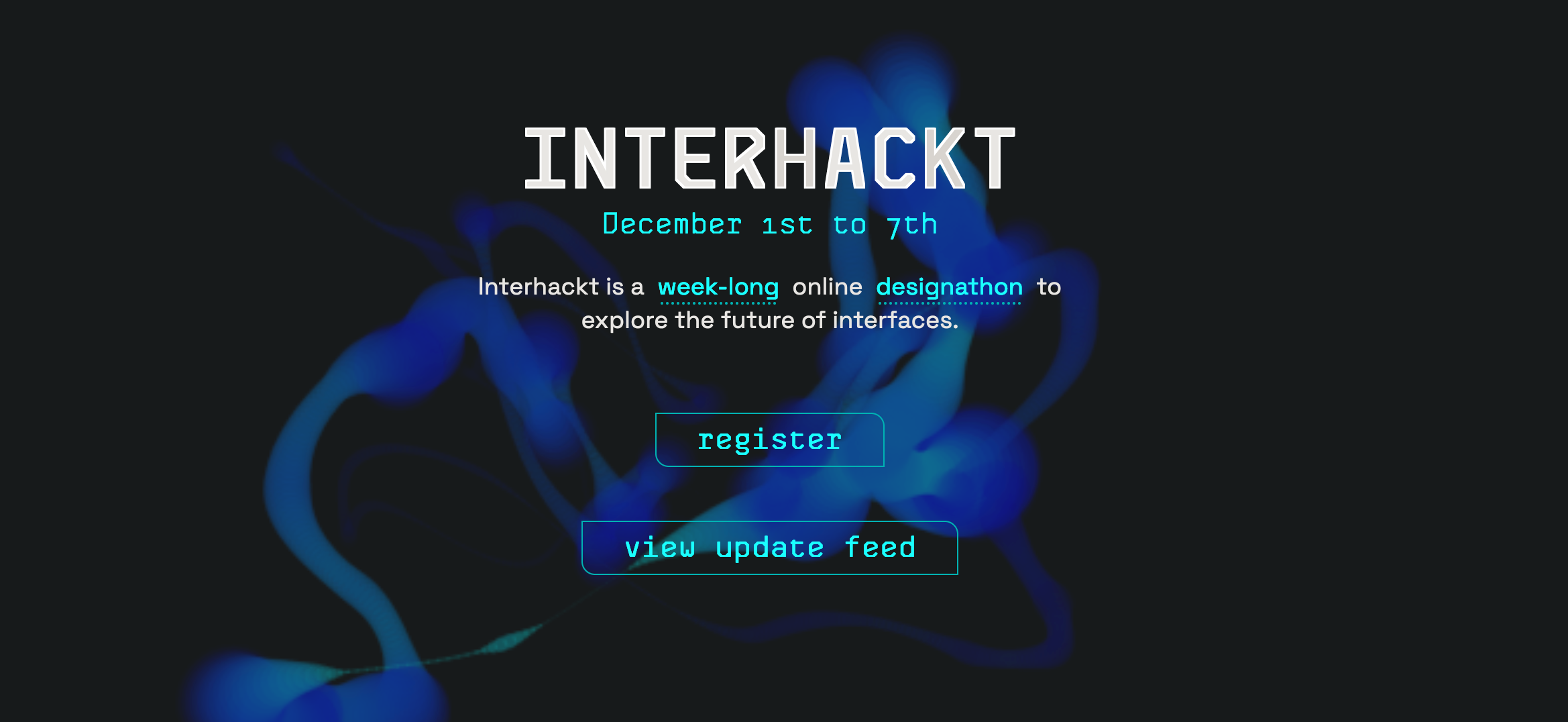Project
Interhackt
Last updated 1 year ago
One day, a random thought popped into my head, “If there was an interaction-design hackathon, it’d be funny if it was called interhackt”

Introduction
There is always a story behind every idea, the series of events leading up to a moment of inspiration. And of course, I’d love to tell a grand narrative for why I decided to run Interhackt — but really, the story is quite simple: it all started with the name. You know how sometimes a word will just pop into your head without any explanation — breaking through the wall of your consciousness like some kind of linguistic kool-aid man? One night, just as I was falling asleep, the word “interhackt” suddenly barged its way into my mind, and I thought, “hey, that would be the perfect name for an interaction design hackathon…” and then I fell asleep.
There was something quite intriguing to me about an interaction
design hackathonWhich I later began to refer to as a
“designathon”
. Many communities have large events to bring them
together, whether game jams, hackathons, conferences, or meetups. There
didn’t feel to be such a community around the particular strain of
interaction design characterized by pushing the boundaries and exploring
future possibilities for how we interact with technology. And while
hackathons are frequented by coders and computer science students, it is
rather difficult to participate if you don’t have coding experience —
which shuts out a wide range of people and perspectives. However, a
designathon could be a more open experience that not only
brings together this community but also is open to participants of all
disciplines and skill levels.
Over the next couple months, the idea of interhackt kept bubbling up in thoughts, in conversations, and one day while brainstorming around collaborative authorship with my friend Jonathan Borichevskiy, we decided to finally make it a reality, decided on a date, and set off organizing the first-ever interaction design hackathon. And I have to say, the week of the designathon was the most intense and exhausting week of my life. What follows is an attempt to document and capture the story of that week.
Overview
Most hackathons and game jamsCompetitions to make an entire video game in a short
period of time, usually with a theme provided that the game must somehow
be centred around; for example Ludum
Dare or the Global Game
Jam. These competitions were a big source of inspiration for me,
having participated very actively in game jams many years ago.
Statistics
- 144 hours duration
-
72,470 words written on the discord across
2985 messages throughout the course of the
designathonAnd the most prolific participant alone wrote over
7000 words throughout their discord conversations over
the course of the week!
- 398 people filled out interest to participate
- 265 people on the interhackt discord channel
- 612 links shared on discord
- 38 projects
- 4 sleepless nights
- 16 events run throughout the week
Drowning is the best time to learn to swim
Looking back through my notebook I come across a line, “drowning is the best time to learn to swim.” It was written at approximately 2am some point halfway through the designathon when I realized the immensity of the task we had taken upon ourselves as organizers. We were not just organizing a hackathon but also running an entire conference and building a social network on the side.
Running a single event in a normal week, I might’ve spent a few days thinking about and consciously preparing — but this was not a normal week! As I sat down in front of my laptop on Thursday morning only five minutes before a talk I was about to give, I felt a sort of cathartic confidence. I felt like I had blindly hurled myself into the deep end; there was no time to think or meticulously plan every movement. Yet somehow, amid all the tumble and chaos, I had managed to surface.
Five minutes? Hah, that’s more than enough time to scrawl a couple talking points on the back of an index card!
What’s next
I would love to run Interhackt again someday and continue fleshing out this format of week-long designathon. It was a lot of effort though and left me burnt out on running social events for quite a while.
Currently however, my focus lies in exploring smaller learning groups and how to foster more spontaneously-forming generative spaces where people can explore new territory of ideas with like-minded peers. The dream eventually is that I may build a community (or a platform) where events like interhackt emerge naturally from the community simply by the system and culture in place.